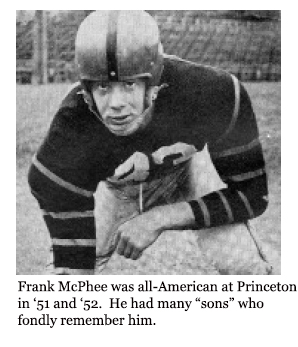The call came just before dinner on a Wednesday in April—a bright, windy day when spring was just taking hold and seemed so full of possibilities. Coach had died the previous Friday in his hometown of Youngstown, Ohio. I hoped that he had not been alone.
I’m told that a close friend, a man who coached alongside him in Houston decades ago, came to see him before he died. And Coach told him he was dying. His friend tried to tell him that he would make it, but this was one contest Coach lost.
Coach had a successful business career in Houston in its boom years, a time when the Astrodome was billed as “the eighth wonder of the world” and the space program was a “space race” with the Soviets, a time of limitless optimism, oblivious to the turmoil that was stirring in the land. A man without sons, he mentored a lot of boys through a youth-league football team, a team that won again and again running the old single-wing formation of his heyday as an All-American end at one of the most prestigious universities in the country. He was rangy and broad shouldered, athletic looking in the way that athletes were before weight training and “performance-enhancing drugs” made bloated supermen out of so many of them. Coach was an ex-Marine. He could cuss with the best of them but was also soft spoken, literate, and not without a certain easy-going American-style polish. He expected the best from himself and those around him without being harsh. He was tough, but without brutality; assertive, but not impolite.
Coach was conservative in the way of the Cold War Right. The revolutionary transformation of his country bewildered and disturbed him. He was, in many respects, representative of the best that the middle-class, mid-century American colossus produced. He came from a town that seemed so American that a studio-era Hollywood screenwriter could not have made it up. Youngstown, Ohio, was a steel city, the cradle of football coaches (his father was one), a working city in the great American dynamo that was. There were some things wrong with that winners-never-quit and quitters-never-win world, but there was so much that was right in it, too, and we are all worse off without its hard-nosed work ethic. Coach eventually went back to Ohio, to a Youngstown much diminished by the decline of the country’s industrial might and, along with it, much of its moral fiber. It’s fitting that he passed away there.
Coach was physically active all the years that he worked in business. He was a tennis player and a golfer with uncanny hand-eye coordination. He would come to our house just before the ten o’clock news and pick me up. We would head for the high-school track, often listening to classical music on the way, where we ran laps, did pull-ups, and crossed the parallel bars. Then Coach would often finish by wrapping a towel around his neck and walking around the cinder track. Sometimes he would light up a cigarette, and we would talk. He brought me books to read, like The Complete Works of Tacitus (I still have it), and we would talk about them. And he taught me some important life lessons: that you could be a tough guy and a gentleman; that brains and brawn could go together; and that success in life wasn’t something that you could measure in dollars. There was a lot I didn’t know about him then because he was a very private man, but he was a successful one in some important ways that he may not have known.
America doesn’t produce men like Coach anymore, and maybe she can’t. But some part of that dynamic America that made him can be kept alive if we remember men like Coach and honor that memory. As flawed as they might have been, the Coaches of the world were real men. Their masculinity was unforced and unselfconscious, and I suspect that working too hard at it would have been seen by them as a character flaw. We’ll miss them when they are all gone, men who seem like mythic heroes now, but we have no choice other than to try to emulate them in some way. Be prepared to be hated for it, but know that hatred doesn’t matter.
If there is a Valhalla for men like Coach, may it echo with the cheers of gridiron triumphs of the days when a tall young man in a letterman’s sweater, the living embodiment of a certain ideal, strode the campus of an Ivy League university at the zenith of American power.

Leave a Reply